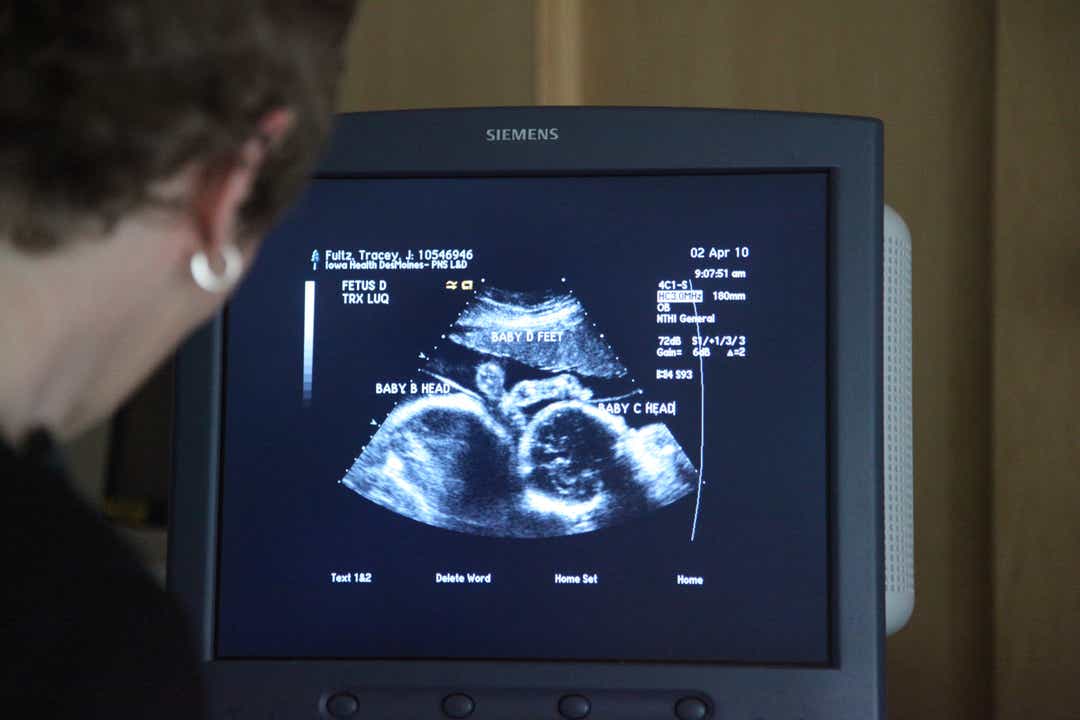The science is conclusive: That fetus is a baby
Drew Zahn Iowa View contributor
Published 7:02 AM EST Dec 12, 2018

An ultrasound is performed at Methodist and Blank Children's Hospital.
Des Moines Register file photo
The Register's Rekha Basu argues in a recent column that calling a fetus a "baby" is somehow a construct of religion and rhetoric, rather than "established science."
The scientific evidence, however, overwhelmingly concludes just the opposite: The preborn child in her mother's womb — she's not just a "fetus," she's a baby.
Many Iowans like me learned middle-school science through textbooks from publishers like McGraw-Hill. Today, those same science textbooks reveal near universal agreement that our human lives begin long before we're born, even before we're considered "viable" to survive outside the womb.
In McGraw-Hill's textbook, "Patten's Foundations of Embryology, 6th ed.," for example, biology professor Bruce M. Carlson of the University of Michigan, writes, "The time of fertilization represents the starting point in the life history, or ontogeny, of the individual."
In other words, you and I begin our lives not when we're born, but when we're conceived.
Another textbook, "Human Embryology and Teratology, 3rd ed.," from publisher Wiley-Liss, asserts that fertilization is the "critical landmark" when a new, genetically distinct human organism is formed. Yet, the text explains, "life is a continuous process" throughout the pregnancy.
As Harvard University Medical School professor Micheline Matthews-Ross testified before a 1981 U.S. Senate Judiciary Committee, "It is scientifically correct to say that an individual human life begins at conception … and that this developing human always is a member of our species in all stages of life" (New York Times, April 26, 1981).
In other words, Matthews-Ross was saying, a baby is a baby — from fertilization, to heartbeat, to birth. Yes, the baby of five weeks in the womb differs from the newborn, but so does the toddler differ from the teen. Scientifically, we pass through different stages as we grow, but we don't pass from person to non-person, or vice versa.
At that same 1981 government hearing, Dr. Watson A. Bowes of the University of Colorado Medical School asserted: "The beginning of a single human life is from a biological point of view a simple and straightforward matter — the beginning is conception. This straightforward biological fact should not be distorted to serve sociological, political or economic goals."
After examining the evidence, the Senate subcommittee reported: "Physicians, biologists and other scientists agree that conception marks the beginning of the life of a human being — a being that is alive and is a member of the human species. There is overwhelming agreement on this point in countless medical, biological and scientific writings." (Subcommittee on Separation of Powers to Senate Judiciary Committee S-158, Report, 97th Congress, 1st Session, 1981)
The 37 years of scientific advancement since that subcommittee hearing have only confirmed its findings. Children survive premature birth today at younger and younger ages, demonstrating how arbitrary it is to argue life doesn't begin until a baby is "viable." And today's 3-D ultrasounds give us astonishing, heartwarming pictures, revealing that the little child in her mother's womb — she's a baby.
"[It] is no longer a matter of taste or opinion," testified professor Jerome LeJuene of the University of Descartes. "It is plain experimental evidence."
Even many abortion advocates have come to grips with this scientific reality. Naomi Wolf, a Clinton advisor and abortion supporter, wrote in The New Republic: "Clinging to a rhetoric about abortion in which there is no life and no death, we entangle our beliefs in a series of self-delusions, fibs and evasions. … The death of a fetus is a real death."
Dr. Bernard Nathanson, who co-founded the abortion advocacy group NARAL and personally presided over 60,000 abortions, later confessed in the film "The Silent Scream" that "Modern technologies have convinced us that beyond question the unborn child is simply another human being, another member of the human community, indistinguishable in every way from any of us."
And at a 2014 panel discussion presented by the National Abortion Federation, Dr. Lisa Harris of Planned Parenthood of Mid and South Michigan put it even more plainly: "[Mothers] are not stupid. They know what’s in there. … It's violence. It's a person. It's killing."
Basu's column ignores this scientific reality, instead raising the tired, misleading straw man that the pro-life argument is inherently religious instead of scientific. But Iowa's Coalition of Pro-Life Leaders includes Catholics, Protestants, agnostics, evangelicals and more — people who would deeply disagree on religion. Yet there's one scientific premise we all agree upon: The unborn child in her mother's womb — she's a baby.
In his Roe v. Wade ruling in 1973, Supreme Court Justice Harry Blackmun also ignored the science, stating, "We need not resolve the difficult question of when life begins. … The judiciary, at this point in the development of man's knowledge, is not in a position to speculate."
The scientific community, however, is at virtual consensus as to when life begins. And it's precisely because Blackmun dodged that question in his 1973 Roe ruling that we're still arguing about abortion today.
You and I have heard all the arguments by now. But there's one fact — "established science" — that can't be argued away: That little child in her mother's womb — she's not just a "fetus," she's a baby.
Aucun commentaire:
Enregistrer un commentaire